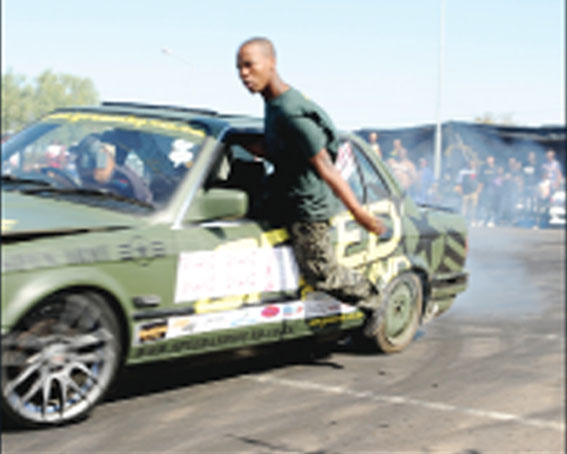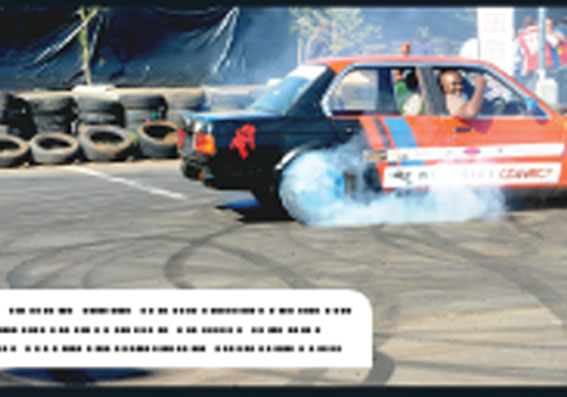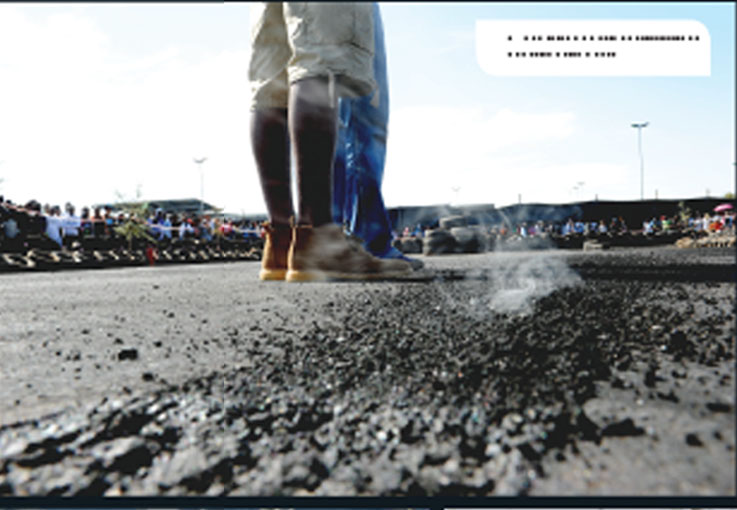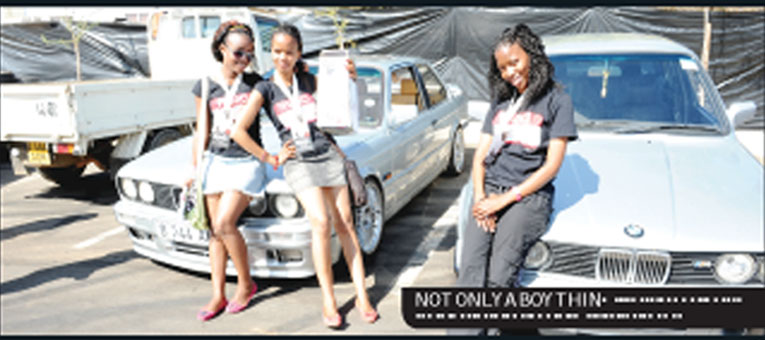Spinning: An illicit urban motorsport?
Source : Kutlwano
Author : Baleseng Batlotleng
Location : Gaborone
Event : Sport
The car skids perilously close to a crowd of spectators clustered behind a wall of old tyres that encircle the small packing lot. “Heelang e thuntse thaere,” (It burst a tyre!), yells a clearly high- spirited young lady seemingly in her early 20s. She is just an inch away from the now smoldering tyres that emit a choking and pungent smell of tar.
Many will agree that high speed car chase and spinning games are a staple of a high octane action movie genre. Judged against the local spectators’ response to the sport, it is just pure adrenalin rush. The acrid smell of smouldering tires and the snarl of the engine have been mainstreamed into a crowd-pulling sport for local motorsport junkies. For those who have not been following spinning quite closely, word has it that it all started as a salute at funerals for either master drivers or those who eked a living by stealing cars.
In fact, spinners admit that the performances would usually start as a way of a memorial services. And now, in its second year in Botswana, spinning has grown by leaps and bounds, becoming the second biggest motorsport in the country after the legendary Toyota Desert Race, popularly known as Mantshwabisi. Since its introduction, local motorsport fans have greeted spinning, which critics say feels like a near death experience, with wild applause. Sexton Leepile and Thuto Rasegojwa, are just a part of the local boys who are trying to clean up the sport’s image by taking what used to be associated with youth culture to a larger audience.
Nevertheless, even the spinners will tell you that there is an element of danger that pervades the sport. Essentially, spinning is a collection of car tricks that the owner’s manual tells him/her never to try at home, with scary names like The burn out, The snake, and The crazy flip. The most revved is the crowd’s favorite, the get out stunt, where the driver sets the car spinning in circles, then gets out, walks around, and bursts into a few dance moves, all while the empty vehicle keeps whirling to the excitement of the crowd before the spinner finally hops back in. The contests are judged on crowd response with style and attitude being important factors.
According to the brainchild behind the popularity of the sport in the country, Joseph Khengere, the sport started off behind the West Gate mall, before it spiraled into a household name. Khengere explains that it all started when he and a friend called Duke Molebatsi operated a car wash when a certain Sexton pulled up in a Mercedes Benz S500 and started spinning the big machine. “That was when our interest blossomed into taking the sport to greater heights because we soon realised the potential in our local spinners who used to throng our spot and perform stunts,” he says.
The interest to grow the sport into a reputable motorsport leaped into neighboring South Africa and caught the attention of renowned clubs such as Revolver Spin club, East Rand Show Stoppers and Spin City Benoni, who are now trading as Speed and Sound Army.
It does not come cheaply to engage in the sport because a single car reportedly gobbles up to P100 000 to be perfectly fitted with specialised features for spinning. Molebatsi points out that a slip differential - extra brake booster, accelerator cable, ignition switch,
and power cut remote control, amongst others - are just some of the specification for such cars. Spin City is a branch of the Mantshwabisi Fan Club, which was registered with the Registrar of Societies in 2005. Meanwhile, Botswana Police Service director of traffic, Senior Assistant Commissioner Katlholo Mosimanegape, says spinning is a relatively new sport in the country which is not provided for under the Road Traffic Act.
“We are a law enforcement body and we can only give authority to any organisation as long as it can provide the necessary documents,” says Mosimanegape.
He notes that after the police realised that people were developing interest in spinning, they have advised that since it is a motorsport people must be mindful of public safety given that most of the events are hosted amidst built up areas. Spin City hosted two events, namely, Spin City Reloaded and The Hurricane Show, before the last show dubbed The July Extreme Auto, which was moved to The Airport Junction Mall – the newly opened multi- million Pula shopping complex.
The Extreme Auto Show attracted spinners from across the border and the highlight of the event was 25-year-old spinner, Sunesh Pursad from East Rand in South Africa and the youngest spinner in the region, 14-year-old Samkeliso Thubane. As a way of giving back to the community, Spin City will organise two events to be known as ‘Beneficiary Tournament’ for Batho Madigela who suffers from chronic renal failure, and Spinning for HIV and Aids. There is no doubt, therefore, that the young lady who screamed: “Heelang e thuntse thaere!,” at the recent Extreme Auto, is in for more breath-taking spins and skids. ENDS
Teaser:
In its second year in Botswana, spinning has grown by leaps and bounds, becoming the second biggest motorsport in the country after the legendary Toyota Desert Race.
















